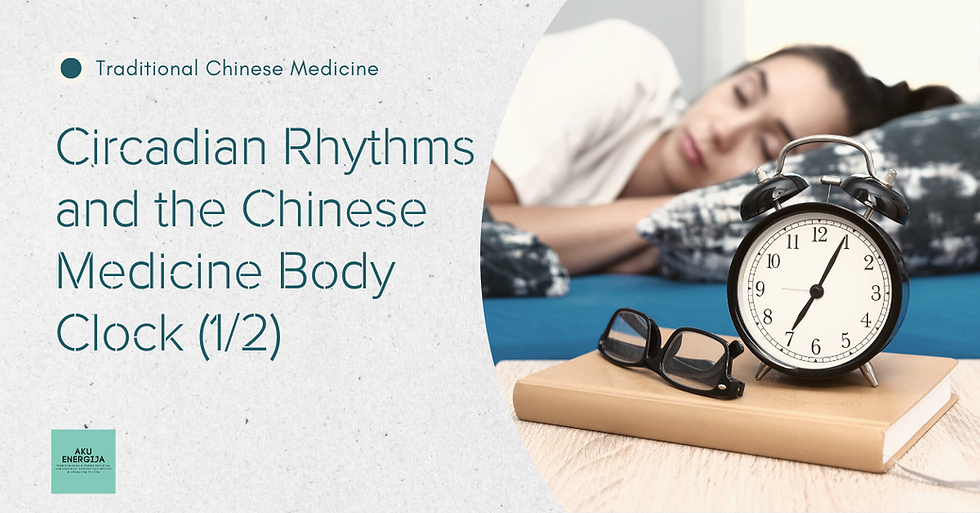Balancing the Thyroid with TCM
- Aku Energija
- Jul 15, 2024
- 4 min read
Feeling burnt out or exhausted? Impaired thyroid functioning may be part of the problem. A little gland located in the neck, the thyroid stores and produces hormones that control every single function in our bodies including maintaining the body’s metabolic rate, growth, detoxification and immunity. We experience issues when our thyroid doesn’t produce hormones, produces too many hormones, doesn’t convert hormones or fails to get hormones into the cells. The most common thyroid problems involve abnormal production of thyroid hormones. Too much thyroid hormone results in a condition known as hyperthyroidism. Insufficient hormone production leads to hypothyroidism.

What Causes Thyroid Problems?
All types of hyperthyroidism are due to an overproduction of thyroid hormones, but the condition can occur in several ways:
Graves' disease: The production of too much thyroid hormone.
Toxic adenomas: Nodules develop in the thyroid gland and begin to secrete thyroid hormones, upsetting the body's chemical balance; some goiters may contain several of these nodules.
Subacute thyroiditis: Inflammation of the thyroid that causes the gland to "leak" excess hormones, resulting in temporary hyperthyroidism that generally lasts a few weeks but may persist for months.
Pituitary gland malfunctions or cancerous growths in the thyroid gland: Although rare, hyperthyroidism can also develop from these causes.
Hypothyroidism, by contrast, stems from an underproduction of thyroid hormones. Since your body's energy production requires certain amounts of thyroid hormones, a drop in hormone production leads to lower energy levels. Causes of hypothyroidism include:
Hashimoto's thyroiditis: In this autoimmune disorder, the body attacks thyroid tissue. The tissue eventually dies and stops producing hormones. [Read more: How to Treat Hashimoto’s Thyroiditis With Chinese Medicine]
Removal of the thyroid gland: The thyroid may have been surgically removed or chemically destroyed, like radioactive iodine for the treatment of hyperthyroidism.
Exposure to excessive amounts of iodide: Cold and sinus medicines, the heart medicine amiodarone, or certain contrast dyes given before some X-rays may expose you to too much iodine.You may be at greater risk for developing hypothyroidism if you have had thyroid problems in the past.
Untreated for long periods of time, hypothyroidism can bring on a myxedema coma, a rare but potentially fatal condition that requires immediate hormone treatment.
How do thyroid problems affect women?
Women are more likely than men to have thyroid disease. One in eight women will develop thyroid problems during her lifetime. In women, thyroid diseases can cause:
Problems with your menstrual period: Your thyroid helps control your menstrual cycle. Too much or too little thyroid hormone can make your periods very light, heavy, or irregular. Thyroid disease also can cause your periods to stop for several months or longer, a condition called amenorrhea. If your body's immune system causes thyroid disease, other glands, including your ovaries, may be involved. This can lead to early menopause (before age 40).
Problems getting pregnant: When thyroid disease affects the menstrual cycle, it also affects ovulation. This can make it harder for you to get pregnant. [Read more: Prevention of infertility with TCM]
Problems during pregnancy: Thyroid problems during pregnancy can cause health problems for the mother and the baby.
Sometimes, symptoms of thyroid problems are mistaken for menopause symptoms. Thyroid disease, especially hypothyroidism, is more likely to develop after menopause.
Conventional medicine for thyroid
To a certain extend, hypothyroidism is a lot easier to treat than hyperthyroidism. Synthroid is a synthetic thyroid hormone in pill form. It stabilizes thyroid function by supplementing thyroid hormones. Patients using thyroid hormone medications need to be monitored on a regular basis to make sure hormone levels are good. With a drug-only treatment approach, most patients will depend on thyroid medications for the rest of their lives.
Hyperthyroidism is a more complex condition to treat. Your doctor's choice of treatment will depend on your symptoms and the cause of your hyperthyroidism. Treatments include:
Medicine: Antithyroid medicines block your thyroid from making new thyroid hormone. These drugs do not cause lasting damage to the thyroid.
Beta-blockers block the effects of thyroid hormone on your body. These medicines can be helpful in slowing your heart rate and treating other symptoms until one of the other forms of treatment can take effect. Beta-blockers do not reduce the amount of thyroid hormones that are made.
Radioiodine: This treatment kills the thyroid cells that make thyroid hormones. Often, this causes permanent hypothyroidism.
Surgery: Thyroid surgery removes most or all of the thyroid. This may cause permanent hypothyroidism.
The current medical therapies for thyroid disorders other than iodine-deficiency goiter are often deemed inadequate because of difficulties in regulating the level of thyroid hormones through use of drugs or an exogenous source of thyroid hormone. As a result, patients often experience only partial relief of the symptoms and those who suffer from hyperthyroidism often have to deal with hypothyroid conditions following medical destruction of the thyroid gland.
Alternative treatment of thyroid by Traditional Chinese Medicine
Thyroid disease is common in my practice, and it is frequently treated by herbal medicine in a combination the patients’ conventional medication. The general outcome is usually positive for primary hyperthyroidism. It means the patients has not yet received any irreversible radical treatment like radioiodine or surgery, nor does the patient have abnormal mass in formation. Usually, after months of treatment together with dietary adjustment and lifestyle changes, the primary hyperthyroid symptoms are improved and that the laboratory measures (such as T3 and T4 levels and iodine uptake) are in the normal range. The initiating factors for autoimmune attack diminished and circulating antibodies against thyroid tissue are reduced.







Comments